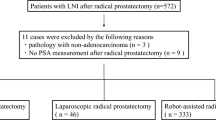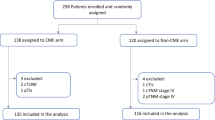Abstract
Total mesorectal excision (TME) is accepted as the gold standard for oncological resection in rectal cancer. The best approach to TME is debated and often surgeons will select a preferred approach. In this study, we aimed to describe how both robotic (R-TME) and transanal (TaTME) TME can be integrated into high-volume rectal cancer surgeon practice with a comparison of clinical and oncological outcomes and cost analysis. A prospective comparative cohort study was performed in a high-volume rectal cancer centre comparing the previous 50 R-TME and 50 TaTME performed by the same surgeon. A comparison of tumour characteristics was performed to highlight a specific role for each technique. Clinical outcomes (operative duration, length of stay (LOS) and perioperative morbidity), cancer quality indicators (resection margin and completeness of TME) and cost analysis were compared. Statistical analysis was performed using IBM SPSS, version 20. R-TME was preferred in mid-rectal cancer, compared to TaTME preferred in low rectal cancer (9 cm vs. 5 cm, p < 0.001). Operative duration was longer in R-TME compared to TaTME (265 vs. 179 min, p < 0.001). Major complications (CD III–IV complications) were experienced in 10% of R-TME and 14% of TaTME (p = 0.476). A 98% (n = 49) clear R0 resection margin was achieved with both R-TME and TaTME and mesorectum quality defined as ‘complete’ in 86% (n = 43) in R-TME and 82% (n = 41) in TaTME. Length of hospital stay was shorter in R-TME (5 vs. 7 days, p = 0.624). An overall difference of €131 was observed favouring TaTME. In high-volume rectal cancer surgery practice, both R-TME and TaTME can be practised and tailored according to patients and tumour characteristics, with comparable clinical and cancer outcomes and is cost-effective.


Similar content being viewed by others
References
Heald R (1988) The ‘Holy Plane’ of rectal surgery. Jouornal R Soc Med 81(9):503–508
Heald RJ, Moran BJ, Ryall RD, Sexton R (1998) Rectal cancer: the basingstoke experience of total mesorectal excision, 1978–1997. Arch Surg 133(8):894–899
Summary E (2018) The 2017 European Society of Coloproctology (ESCP) international snapshot audit of left colon, sigmoid and rectal resections—executive summary. Colorectal Dis 20:13–14
Stevenson ARL et al (2015) Effect of laparoscopic-assisted resection vs open resection on pathological outcomes in rectal cancer: the ALaCaRT randomized clinical trial. JAMA J Am Med Assoc 314(13):1356–1363
Jeong SY, Park JW, Nam BH, Kim S, Kang SB, Lim SB, Choi HS, Kim DW, Chang HJ, Kim DY, Jung KH, Kim TY, Kang GH, Chie EK, Kim SY, Sohn DK, Kim DH, Kim JS, Lee HS, Kim JH (2014) Open versus laparoscopic surgery for mid-rectal or low-rectal cancer after neoadjuvant chemoradiotherapy (COREAN trial): survival outcomes of an open-label, non-inferiority, randomised controlled trial. Lancet Oncol 15(7):767–774
Fleshman J, Branda M, Sargent DJ et al (2015) Effect of laparoscopic- assisted resection vs open resection of stage II or III rectal cancer on pathologic outcomes: the ACOSOG Z6051 randomized clinical trial. JAMA J Am Med Assoc 314(32):1346–1355
Guillou PJ, Quirke P, Thorpe H et al (2005) Short-term endpoints of conventional versus laparoscopic-assisted surgery in patients with colorectal cancer (MRC CLASICC trial). Lancet 365(9472):1728–1726
Kang SB, Ji WP, Jeong SY et al (2010) Open versus laparoscopic surgery for mid or low rectal cancer after neoadjuvant chemoradiotherapy (COREAN trial): short-term outcomes of an open-label randomised controlled trial. Lancet Oncol 11:637–645
van der Pas M, Haglind E, Cuesta M et al (2013) COlorectal cancer Laparoscopic or Open Resection II (COLOR II) Study Group Laparoscopic versus open surgery for rectal cancer (COLOR II): short-term outcomes of a randomised, phase 3 trial. Lancet Oncol 14(03):210–218
YP Rose Khavari Nicholas Dias (2017) Disease free survival and local recurrence for laparoscopic resection compared to open resection of stage II-III Rectal cancer: follow up results of the ACOSOG Z6051 randomized controlled trial. Physiol Behav 176(3):139–148
Park J et al (2021) Open versus laparoscopic surgery for mid or low rectal cancer after neoadjuvant chemoradiotherapy (COREAN trial): 10-year follow-up of an open-label, non-inferiority, randomised controlled trial. Lancet Gastroenterol ad Hepatol 6(7):569–577
Jayne D et al (2017) Effect of robotic-assisted vs conventional laparoscopic surgery on risk of conversion to open laparotomy among patients undergoing resection for rectal cancer the rolarr randomized clinical trial. JAMA J Am Med Assoc 318(16):1569–1580
Corrigan N, Marshall H, Croft J, Copeland J, Jayne D, Brown J (2018) Exploring and adjusting for potential learning effects in ROLARR: a randomised controlled trial comparing robotic-assisted vs. standard laparoscopic surgery for rectal cancer resection. Trials 19(1):1–11
Kim MJ et al (2018) Robot-assisted versus laparoscopic surgery for rectal cancer: a phase II open label prospective randomized controlled trial. Ann Surg 267(2):243–251
Larsen SG, Pfeffer F, Kørner H (2019) Norwegian moratorium on transanal total mesorectal excision. Br J Surg 106(9):1120–1121
Fearnhead NS et al (2020) The ACPGBI recommends pause for reflection on transanal total mesorectal excision. Color Dis 22(7):745–748
Harji D et al (2021) The feasibility of implementing an enhanced recovery programme in patients undergoing pelvic exenteration. Eur J Surg Oncol 47(12):3194–3201
McLemore EC, Lavi P, Attaluri V (2020) Learning transanal total mesorectal excision. Clin Colon Rectal Surg 33(3):168–172
L’Etude Nationale des Coûts (ENC) MCO (2018) Available at: https://www.atih.sante.fr/information-sur-lescouts/etudes-nationales-de-couts-presentation-et-recrutement. Accessed 01 May 2022
Kim JY, Kim YW, Kim NK et al (2011) Pelvic anatomy as a factor in laparoscopic rectal surgery: a prospective study. Surg Laparosc Endosc Percutan Tech. 21:334–339
Jayne DG et al (2007) Randomized trial of laparoscopic-assisted resection of colorectal carcinoma: 3 Year results of the UK MRC CLASICC trial group. J Clin Oncol 25(21):3061–3068
Parascandola SA et al (2021) The robotic colorectal experience: an outcomes and learning curve analysis of 502 patients. Color Dis 23(1):226–236
Adamina M et al (2020) International expert consensus guidance on indications, implementation and quality measures for transanal total mesorectal excision. Color Dis 22(7):749–755
Prete FP et al (2018) Robotic versus laparoscopic minimally invasive surgery for rectal cancer: a systematic review and meta-analysis of randomized controlled trials. Ann Surg 267(6):1034–1046
Lee SH, Kim DH, Lim SW (2018) Robotic versus laparoscopic intersphincteric resection for low rectal cancer: a systematic review and meta-analysis. Int J Colorectal Dis 33(12):1741–1753
Yuan DB, Wen XN, Xu XC, Li T (2012) Robotic versus laparoscopic total mesorectal excision for rectal cancer: a meta-analysis. World Chinese J Dig 20(36):3804–3810
Fleming CA, Cullinane C, Lynch N, Killeen S, Coffey JC, Peirce CB (2021) Urogenital function following robotic and laparoscopic rectal cancer surgery: meta-analysis. Br J Surg 108(2):128–137
Luca F et al (2018) Sexual and urinary outcomes in robotic rectal surgery: review of the literature and technical considerations. Updates Surg 70(3):415–421
Deleon MF, Maloney Patel N (2015) RC “Robotic colorectal surgery: outcomes and cost analysis at a single institution.” In: American Society of Colon and Rectal Surgeons Annual Scientific Meeting. p MA2015
Deleon MF, Maloney Patel N (2016) “Robotic surgery for diverticulitis—is it cost effective?” In: American Society of Colon and Rectal Surgeons Annual Scientific Meeting. CA2016.
Rouanet P, Mermoud A, Jarlier M, Bouazza N, Laine A, Mathieu Daudé H (2020) Combined robotic approach and enhanced recovery after surgery pathway for optimization of costs in patients undergoing proctectomy. BJS open. 4(3):516–523
Carmichael H, Sylla P (2020) Evolution of transanal total mesorectal excision. Clin Colon Rectal Surg 33(3):113–127
Burghgraef TA et al (2021) Laparoscopic versus robot-assisted versus transanal low anterior reseion: 3 year oncologic results for a population-based cohort in experienced centers. Ann Surg Oncol 29(3):1910–1920
van der Heijden JAG et al (2020) Functional complaints and quality of life after transanal total mesorectal excision: a meta-analysis. Br J Surg 107(5):489–498
Koedam TWA et al (2017) Transanal total mesorectal excision (TaTME) for rectal cancer: effects on patient-reported quality of life and functional outcome. Tech Coloproctol 21(1):25–33
Roodbeen SX et al (2021) Local recurrence and disease-free survival after transanal total mesorectal excision: results from the international TaTME registry. JNCCN J Natl Compr Cancer Netw 19(11):1232–1240
Miskovic D et al (2019) European consensus on the standardization of robotic total mesorectal excision for rectal cancer. Color Dis 21(3):270–276
Tou S et al (2020) European expert consensus on a structured approach to training robotic-assisted low anterior resection using performance metrics. Color Dis 22(12):2232–2242
Rouanet P et al (2019) Rectal Surgery Evaluation Trial: protocol for a parallel cohort trial of outcomes using surgical techniques for total mesorectal excision with low anterior resection in high-risk rectal cancer patients. Color Dis 21(5):516–522
Funding
No funding was specifically received for this study. The authors declare that no funds, grants, or other support were received during the preparation of this manuscript.
Author information
Authors and Affiliations
Contributions
CF: study conceptualisation, study design, data synthesis and analysis, manuscript draft, manuscript final approval BF: data synthesis and analysis, manuscript draft, manuscript final approval LB: data synthesis and analysis, manuscript draft, manuscript final approval TC: study design, data synthesis and analysis, manuscript draft, manuscript final approval QD: study conceptualisation, study design, data synthesis and analysis, manuscript draft, manuscript final approval.
Corresponding author
Ethics declarations
Conflict of interest
The authors have no relevant financial or non-financial interests to disclose.
Ethical approval
This study was performed in line with the principles of the Declaration of Helsinki.
Additional information
Publisher's Note
Springer Nature remains neutral with regard to jurisdictional claims in published maps and institutional affiliations.
Supplementary Information
Below is the link to the electronic supplementary material.
Rights and permissions
Springer Nature or its licensor (e.g. a society or other partner) holds exclusive rights to this article under a publishing agreement with the author(s) or other rightsholder(s); author self-archiving of the accepted manuscript version of this article is solely governed by the terms of such publishing agreement and applicable law.
About this article
Cite this article
Fleming, C., Fernandez, B., Boissieras, L. et al. Integrating a tumour appropriate transanal or robotic assisted approach to total mesorectal excision in high-volume rectal cancer practice is safe and cost-effective. J Robotic Surg 17, 1979–1987 (2023). https://doi.org/10.1007/s11701-023-01577-z
Received:
Accepted:
Published:
Issue Date:
DOI: https://doi.org/10.1007/s11701-023-01577-z




